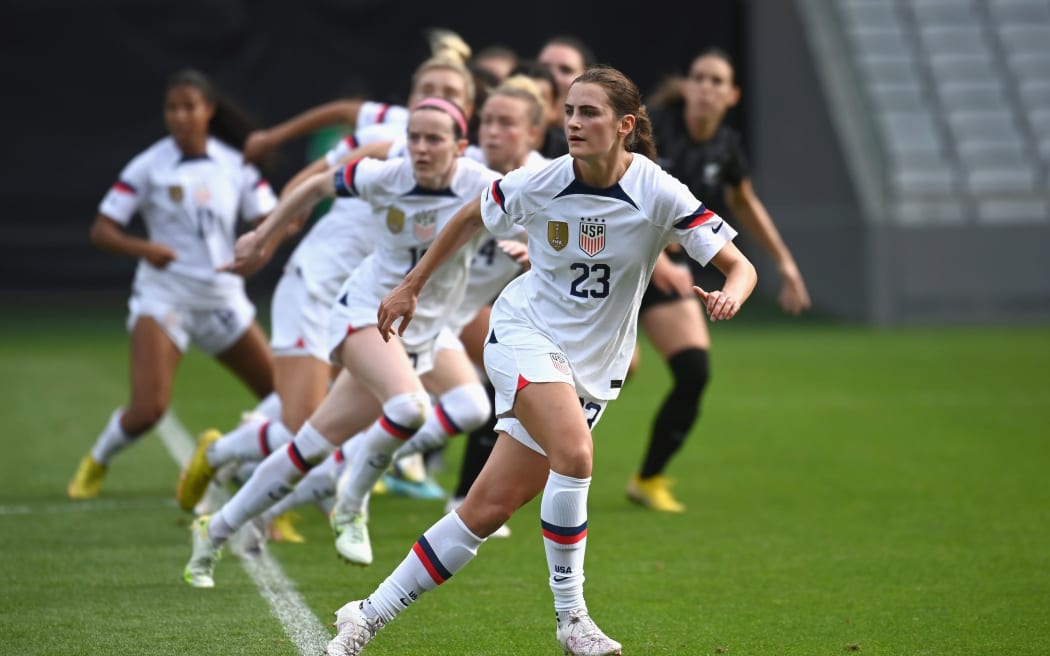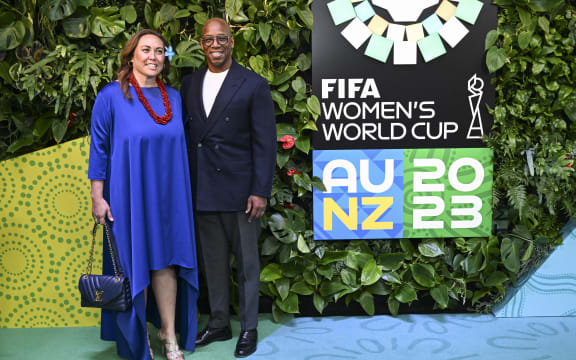
USA team in action against New Zealand, 2023 Photo: Photosport
Two top FIFA officials have stood by the decision to "unbundle" the 2023 Women's World Cup from the men's tournament for the first time, saying commercial separation is a necessary step on the path to gender equality in football, even if it has to drag some broadcasters "kicking and screaming" to get there.
FIFA secretary general Fatma Samoura - and head of women's football New Zealander Sarai Bareman - are in Sydney this week to check on preparations for the tournament that is now just 72 days away.
Their visit coincides with last-minute negotiations between FIFA and the broadcasters of five big European countries - England, Germany, Italy, France and Spain - which president Gianni Infantino has repeatedly criticised for offering "10 to 100 times less" to broadcast the Women's World Cup, compared with the men's.
Last week, Infantino even went as far as to publicly threaten a total blackout of July's tournament in these nations if their offers didn't improve, with FIFA's own free online platform FIFA+ believed to be a possible alternative if talks break down.
FIFA has been trying to commercialise the Women's World Cup as a stand-alone product, but Bareman admits it has been more challenging than they expected to get some major partners on board.

Sarai Bareman and Ian Wright at the World Cup draw Photo: AFP
"From the commercial side, it is a change. It's a departure from business as usual, and the way things have been done for years," she told the ABC.
"FIFA has recognised the importance of women's football.
"Since the reforms have begun and the new team has come in from 2016, we've got a new women's football division, we've got a dedicated commercial strategy, we're ring-fencing specific investments, we're increasing the number of women in decision-making positions.
"There really needs to be a broad-brush approach to raise the game. And part of that is looking at it from a different lens commercially.
"Sometimes, it is a bit of a journey to bring people along onto the same page as us, but it has to be done.
"It's no secret: Women's football has been historically, and institutionally, discriminated against. Now is the time, from every angle, to change that and, if we have to drag people along kicking and screaming, then so be it."
While FIFA has not specified what an appropriate bid for the Women's World Cup looks like, its regular citation of viewership figures - where the 2023 edition is expected to attract roughly half the number of eyeballs as the men's - suggests broadcasters should be offering proportionally the same amount.
Samoura said FIFA was "quite confident that common ground will be found", while also reiterating Infantino's point that increasing investment into the women's game, overall, requires major partners to do their bit too.
"We cannot walk alone," Samoura told the ABC.
"FIFA is not a subsidised agency. All our money comes from either sponsors or broadcasters and broadcasters, alone, play a very important part in the investment we're doing into football.
"And if you really want to reach our ambitious aim of having 60 million women registered as players … we need Europe.

French fans watch football on tv Photo: AFP
"While we cannot disclose commercial figures, [some broadcasters] were proposing offers that were 2 per cent of what they would offer for the men's game. When we know that the audience in women's football is just under half of the men's one.
"Without the sponsors, without broadcasters, there is very little we can do to match all the requirements and also [pursue] equal pay and treat men and women equally. We need them."
Despite these financial challenges - which may indicate that the women's tournament is not quite ready for total commercial separation just yet - FIFA has continued to increase its investment in the event regardless, with more money poured into July's World Cup than ever before.
For the first time, every team competing in the Women's World Cup will receive the same conditions and "service levels" as the men's tournament, including class of travel, delegation size, accommodation standards and access to a team base camp.
Further, the 2023 tournament will see a threefold increase to prize money compared to 2019 - from $US60 million (NZ$95 million) to $US110m - as well as boosts to the amount provided to national teams for their tournament preparation ($US11.5m to $US30.7m, or roughly $US960,000 for each team), and to the clubs that develop and release players for the window (from $US8.5m to $US11.5m).
Samoura said FIFA was now "fine-tuning" how the overall money is allocated to teams that make it to various stages of the tournament, while also revealing that a proposal is in the works to distribute prize money directly to players, as opposed to giving it to their respective federations to distribute as they see fit.
In addition, FIFA has been "quietly working" behind the scenes on a number of major programs in the women's space, particularly the global Female Health Project, which includes research into ACL injuries, gender-specific tournament preparation strategies, menstrual health education and pre- and post-partum care.
-ABC

